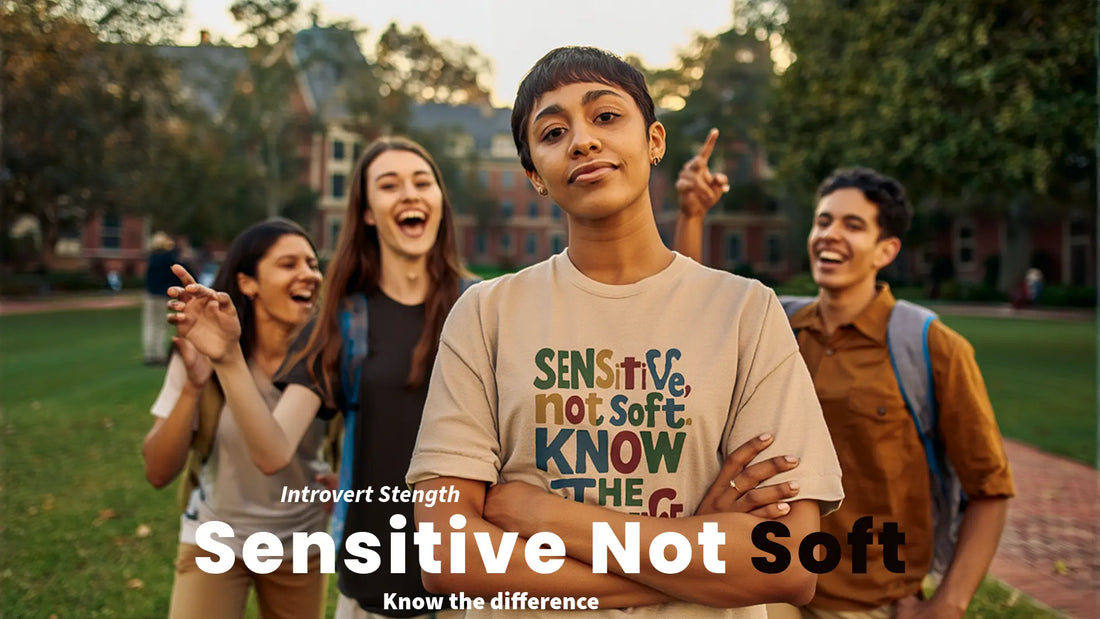
Sensitive Not Soft: Why Quiet Strength is Your New Superpower (and How to Own It)
Share
Introduction:
Why Quiet Isn’t Weak: It's Your Greatest Weapon
While society often values noise, the strength of quietness is frequently overlooked. Many experience being misread or mislabeled as shy, passive, or overly sensitive. Sensitivity is not a flaw but a refined strength. This guide offers expert insights to help you embrace your quiet power and make "Sensitive Not Soft" your defining statement.
Misunderstood and Misread: The Quiet Struggle
“Why are you so quiet?” You've heard it - probably too often. Peter Vogt, creator of "The Introvert Shame Phenomenon," pinpoints why introverts feel shame simply for being quiet. He explains how society perpetuates the misconception that introversion equates to weakness or dysfunction, thereby creating internal self-doubt. (Vogt, n.d.) (Vogt, n.d.) (Vogt, n.d.)
Nice Does Not Mean a Doormat
Many hear, “You need to speak up more.” "A Nice Person’s Guide To Becoming More Assertive" explains that low assertiveness can lead to anxiety, resentment, and misunderstood intentions. Assertiveness is not aggression; it reflects integrity, self-respect, and clear communication.
Actionable Insight: Begin with small, assertive statements to reclaim your voice without losing kindness.
Identity Erased by Assumption
Identity invalidation is a subtle but significant dismissal of personal identity. Whether cultural, racial, or emotional, it can cause internal conflict and social withdrawal. The Fiveable guide on "Identity Invalidation" recommends open dialogue to reduce isolation and internalized shame.
Power Move: Wear your truth confidently. Identity isn’t up for debate - it’s yours alone.
The Danger of Social Misattribution
Quietness is often misinterpreted as disinterest or aloofness, a phenomenon known as misattribution. This common misunderstanding can lead to unnecessary conflict, as detailed in Fiveable’s analysis of "Social Misattribution."
Clarity Moment: Your quietness isn’t awkwardness. It's a thoughtful presence.
Emotional Intelligence Isn’t a Weakness
Society often mislabels emotional expressiveness as weakness. However, research on "Perceived Social Competence" indicates that emotional intelligence and relationship management skills are predictive of healthier relationships and lower depressive symptoms.: Own your emotional depth.
Sensitivity indicates a strength in navigating complex emotions.
How 'Sensitive Not Soft' Changes the Game
The "Sensitive Not Soft" tee is more than a style statement; it represents a quiet revolution. It affirms that sensitivity is not softness, introversion is not inadequacy, and assertiveness is not aggression. Wearing it communicates your boundaries clearly and confidently.
Statement Piece: It’s your unspoken clarity in a noisy world.

Embrace Your Quiet Strength: Practical Steps to Flourish
- Validate Your Feelings: Your sensitivity is a valuable guide, not a problem to solve.
- Practice Assertive Communication: Using small, clear statements builds confidence.
- Challenge Negative Self-Talk: Address Introvert Shame Directly. You’re exactly as strong as you need to be.
- Wear Your Truth Proudly: Apparel with meaning, such as the "Sensitive Not Soft" tee, helps you reclaim your narrative.
Conclusion:
Quiet Strength Isn’t a Paradox; It's a Powerhouse
Sensitivity is not a vulnerability; it is a form of strength. Quietness is not a sign of weakness, but a strategic asset. By embracing these qualities, you transform your quiet nature into a powerful presence. "Sensitive Not Soft" is more than apparel; it is a personal manifesto.
Begin turning sensitivity into strength by making your statement clear and confident.
